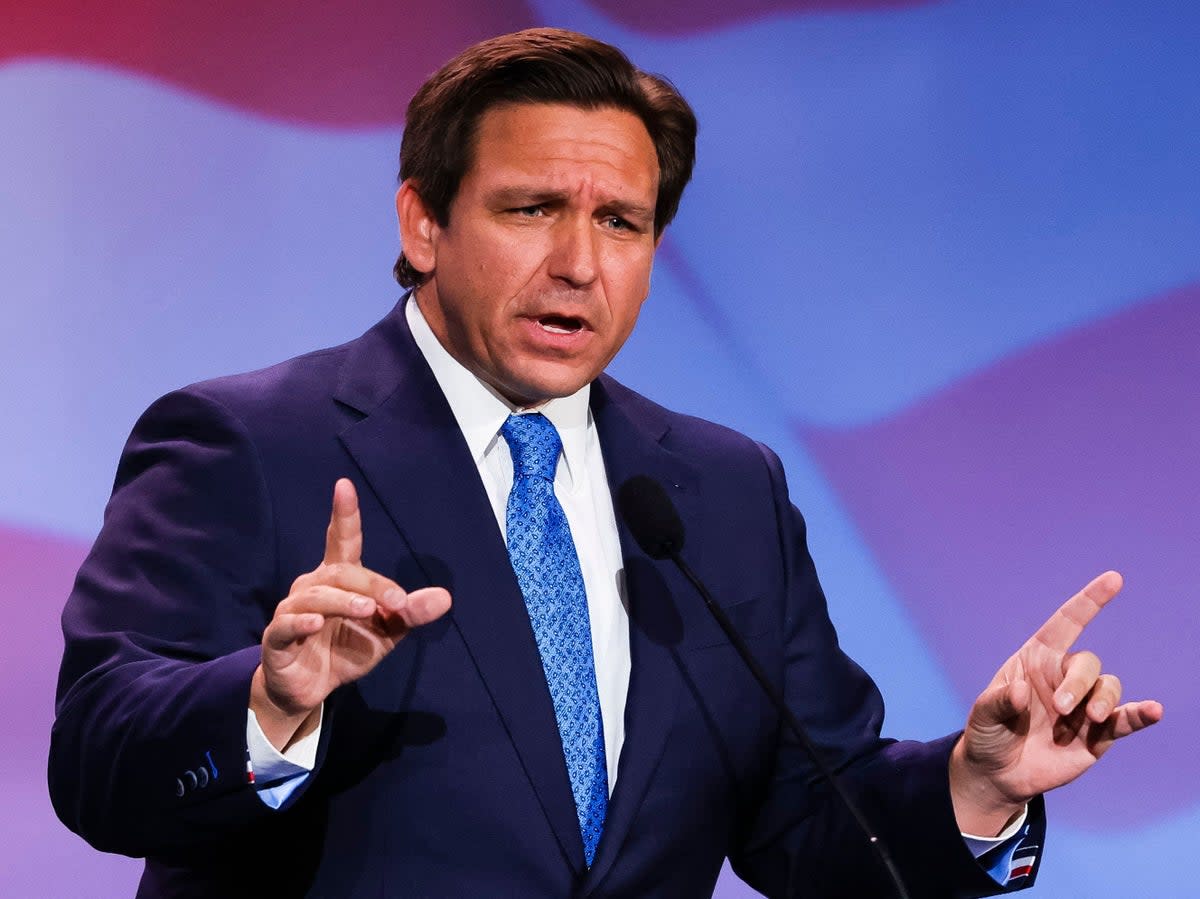Voices: The right’s delusions about Ron DeSantis

- Oops!Something went wrong.Please try again later.
- Oops!Something went wrong.Please try again later.
- Oops!Something went wrong.Please try again later.
Last year, during the January 6 hearings, one Republican told me that the GOP needed to move on from Donald Trump, particularly if they ever wanted to have a chance to win back suburban women voters. Similarly, last week, Politico wrote that many Republican donors and activists hoped that a Ron DeSantis candidacy would mean that they would get all of the benefits of a Trump presidency but “The suburbs would be back in play”.
Part of this belief stemmed from the fact that Mr DeSantis resoundingly won re-election in Florida last November. But that failed to factor in the low voter turnout, the state’s overall rightward lurch that began during his tenure in Tallahassee and the fact that elsewhere in the country, particularly in states like Pennsylvania and Arizona, voters rejected candidates whom Mr DeSantis supported.
Republicans would love to be able to have a sort of super-candidate who could simultaneously pass all of the policies Mr Trump enacted, nominate all of his judges, not fire off tweets that cause them headaches, but also help them get back on the path of victories in the suburbs while also not alienating the very non-college-educated voters (including a non-negligible slice of people of colour) that Mr Trump brought into the Republican fold.
But Mr DeSantis likely isn’t that candidate and he certainly isn’t the beta version of Mr Trump. If anything, he is likely to be the next version of Ted Cruz.
Many people forget that before Mr Trump dubbed the Texas senator “Lyin’ Ted,” he was seen as the avatar for the conservative movement in the way Mr DeSantis has become. Much like how Mr DeSantis became a conservative for his decision as governor to mostly keep the state open and eschew mask and vaccine mandates during the Covid-19 pandemic, Mr Cruz earned plaudits for his stunts such as conducting a faux filibuster in an attempt to shut down the government to defund Obamacare.
While many mocked Mr Cruz for reading Green Eggs and Ham on the Senate floor, conservative media pundits, activists and voters saw Mr Cruz as a warrior not only against Democrats and Barack Obama but also against Republican leadership. Incidentally, Rep Chip Roy (R-TX) who was Mr Cruz’s chief of staff during the government shutdown and who never got on well with Mr Trump, has gotten behind behind Mr DeSantis.
In the same way, Mr Cruz’s strident social conservatism made him a hero among evangelicals. When he announced his candidacy for president, Mr Cruz did so at Liberty University, which Jerry Falwell Sr, a leader in the religious right, founded. His ardent opposition to abortion rights and same-sex marriage made him seem like the perfect candidate for evangelicals (it didn’t hurt that his father was a preacher).
I was immediately reminded of that when it was revealed that Mr DeSantis boasted that he or another president could usher in a 7-2 conservative Supreme Court majority for a quarter century. That alone wasn’t a surprise: Mr DeSantis needs to win the “Tax Cuts and Judges” Republicans if he is to pose any threat to Mr Trump.
What was telling was he did so at the National Religious Broadcasters Convention in Orlando. White (and Latino) evangelicals will play a vital role for Mr DeSantis and he will make a play for them. Mr Trump enjoyed sky-high approvals from the demographic, largely on the back of nominating the Supreme Court majority that would eventually overturn Roe v Wade.
But the religious group that spent decades preaching about morality also compromised themselves in the eyes of many by running with a twice-divorced casino owner. Mr DeSantis’s speech essentially offered them an alternative to say that they can get conservative justices and vote for a military veteran who cared for his wife during her recovery from breast cancer.
Similarly, many of the Republican operatives, including Mr Cruz’s 2016 campaign manager Jeff Roe and his delegate counter Ken Cuccinelli (who served in the Trump administration), have gotten behind Mr DeSantis.
In some ways, being the heir to Mr Cruz could work well for Mr DeSantis. Mr Cruz won the Iowa caucus in 2016 and put up a respectable second place in the overall fight for the GOP nomination.
But if Mr DeSantis inherits Mr Cruz’s advantage, he also likely has his disadvantages. Mr Cruz’s penchant for picking fights with Republican leadership meant when the 2016 primary became a two-man race against him and Mr Trump, few Republicans put their weight behind him (former House Speaker John Boehner, whom Mr Cruz tormented, called him “Lucifer in the Flesh”).
Incidentally, Mr DeSantis was raising hell in the House at the same time Mr Cruz caused a ruckus in the Senate, as he helped co-found the House Freedom Caucus. But Mr DeSantis’s aloofness and unwillingness to press the flesh has left a bad taste in the mouths of his former House GOP colleagues in the way Mr Cruz’s pugnaciousness did. That unnecessary antagonising of his colleagues partially contributed to so many Florida Republicans getting on the Trump train.
Mr Cruz’s zealotry on politics has cost him in the long term. After his presidential campaign, he had a near-death experience in his 2018 re-election campaign when he underperformed in places like the suburbs of Houston. In the same way, Mr DeSantis’s firebreathing on abortion and LGBT+ rights could cause suburbanites to opt for a Democrat.

